by Pinchas Cohen
Key Events
- Asian shares close at 2-year high
- European shares gain on metals, fall on travel and leisure
- Traders ignore disappointing German industrial production, buy euro
- Oil investors await OPEC compliance talks
- FOMC members set to speak. Kashkari tweeted his indifference to job reports. What will Bullard say?
Global Affairs
On Friday, Asian equities were led to their highest levels in nearly a decade on a record close for the Dow, as well as a rebound from the dollar, after the US jobs report came in better than expected. It seems there is a level of persistent optimism—by equity investors, as opposed to currency and bond traders—regarding the US economy and its ability to keep up with global growth.
Investors are impressed with the manner in which the Dow managed its newest conquest. It didn’t just register a new all-time-high, but achieved a record close on Friday above the key 22,000 level, even if investors left themselves in vulnerable position for a whole weekend—especially considering the precarious situation the US political landscape is currently in. Perhaps this is yet another example of equity investors’ disregarding political risk, the new-normal since the Brexit vote.
In the jobs report, the US managed to exceed expectation surpassing the estimated 180,000 new jobs with a total of 209,000. This time around it finally included the lower part of the professional pyramid—low-wage positions in industries such as the restaurant sector and health-care services. The report also reveals a tepid yet rising trend in wage growth, from 0.1 percent in May, 0.2 percent in June, to 0.3 percent in July. Should this trend continue, another rate hike in December would be back on the table.
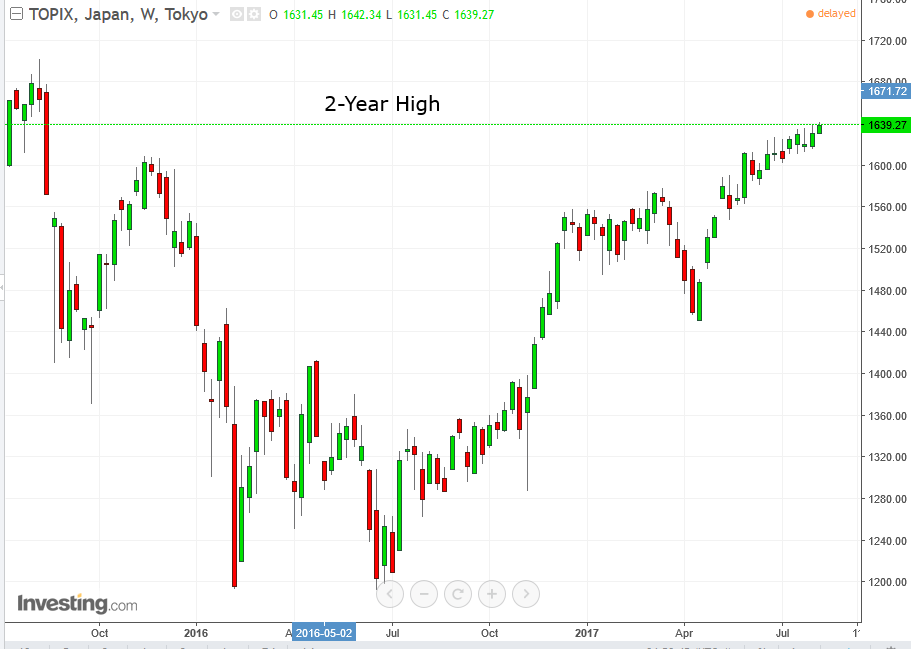
Toyota Motor's (T:7203) earnings, compounded by a weak yen, led Japan’s TOPIX to close at a two-year high. Gains were seen also in indices across Australia, South Korea and Hong Kong.
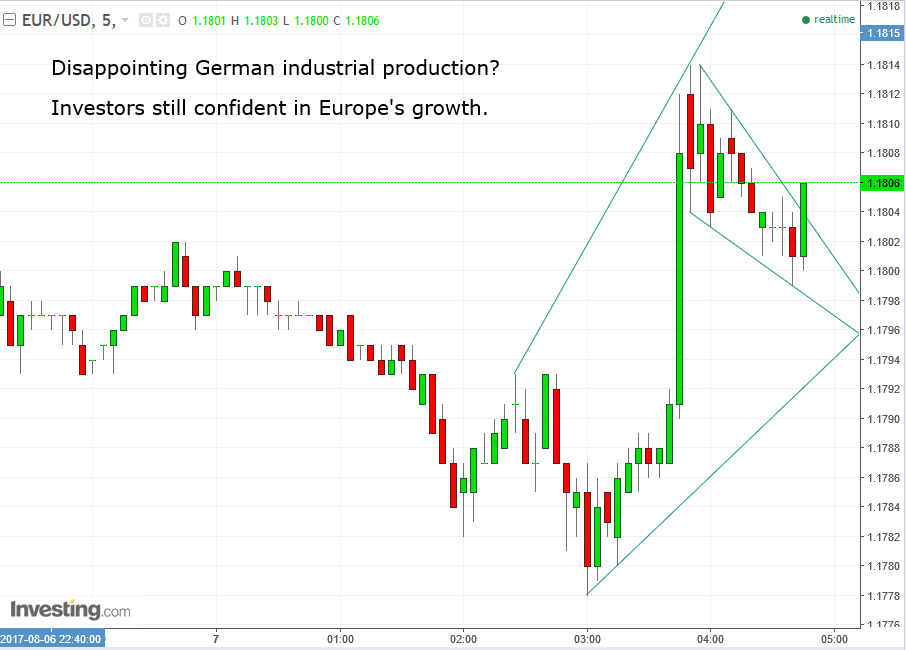
In Europe, German industrial production unexpectedly fell in June for the first time this year. Euro investors seem unfazed, as they still drove up the currency, as Europe is seeing its strongest growth since the 2008 recession.
Travel and leisure shares, including Lufthansa and EasyJet, led declines in European stocks, erasing gains by ArcelorMittal (LON:0RP9), BHP Billiton (LON:BLT) and Anglo American (LON:AAL), who were led up by iron ore and steel prices.
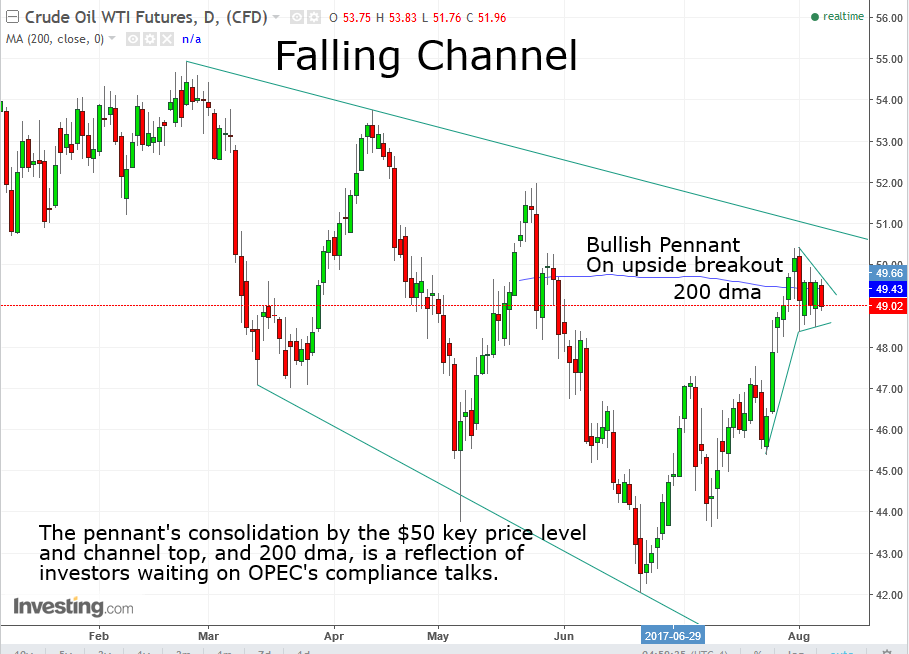
Oil stayed steady at $49 a barrel, as investors wait under the $50 key level for upcoming OPEC talks discussing potential cuts to reduce the global glut of crude.
Up Ahead
- 11:45: US - FOMC member Bullard speaks: Last Tuesday Bullard told Market News International that “given the inflation outlook, which has deteriorated in 2017, I would not support further moves in the near term. It's possible data will turn around, but we’ll have to see. I think for now we should remain on pause.” As someone who tells it like it is and is opposed to another hike at the current state, what Bullard says today may have a strong effect on the dollar.
- 13:25: US - FOMC member Kashkari speaks: Kashkari wants the Fed to hold off hiking rates until inflation makes a show. In fact, this has been his opinion all year, even when Yellen was pushing to raise rates in the June Fed meeting. As opposed to Bullard, Kashkari already made his opinion on the latest US job report clear. He tweeted: “Why does jobs report give us more confidence about inflation?". Economists have repeatedly declared the market has reached "max employment,” but are then surprised by strong job growth and weak wages/inflation. This report is more of same, with nothing new being revealed. Therefore, Kashkari repeating this same mindset today should have less of an effect than if Bullard will express those same opinions.
- OPEC, NOPEC will discuss agreement compliance, which fell 14% in July.
Market Moves
Stocks
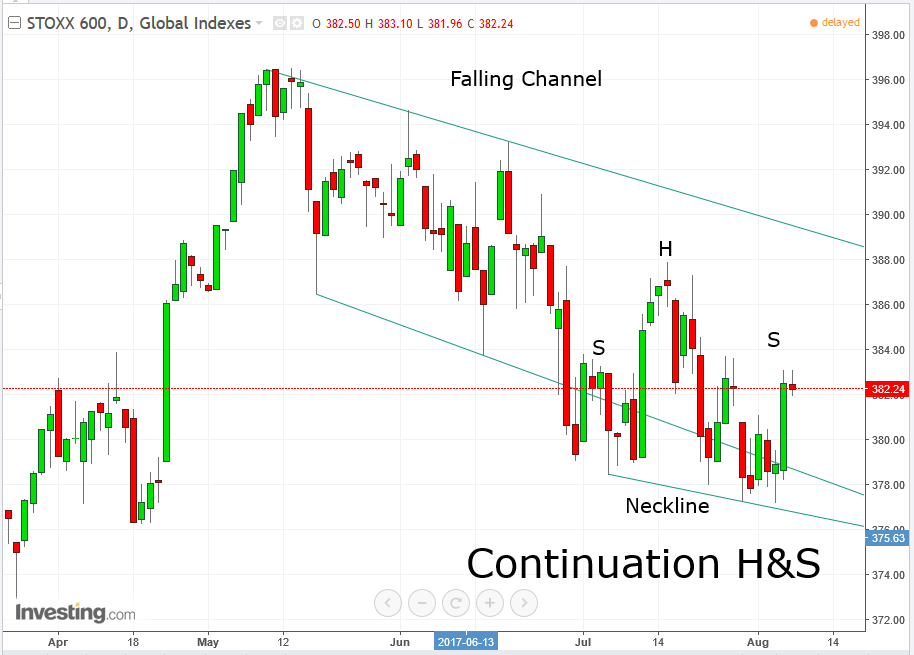
- The Stoxx Europe 600 fell 0.1 percent to 382.30 as of 9:04 a.m. in London.
- The UK’s FTSE 100 jumped 0.3 percent, its highest in two months on a closing basis.
- Germany’s DAX declined less than 0.05 percent.
- The MSCI All Country World Index increased 0.2 percent, its highest level on record.
- S&P 500 Futures advanced 0.2 percent, their highest on record, achieving their biggest gain in a week.
- Japan’s TOPIX rose 0.5 percent. Toyota jumped 2 percent after it beat first-quarter profit estimates and raised its full-year forecast on Friday.
- Australia's S&P/ASX 200 was up 0.9 percent with miners and banks advancing.
- South Korea’s KOSPI gained 0.1 percent.
- In Hong Kong, the Hang Seng Index rose 0.4 percent.
- The MSCI Asia Pacific Index added 0.5 percent; it's now trading near its highest point since December 2007.
Currencies
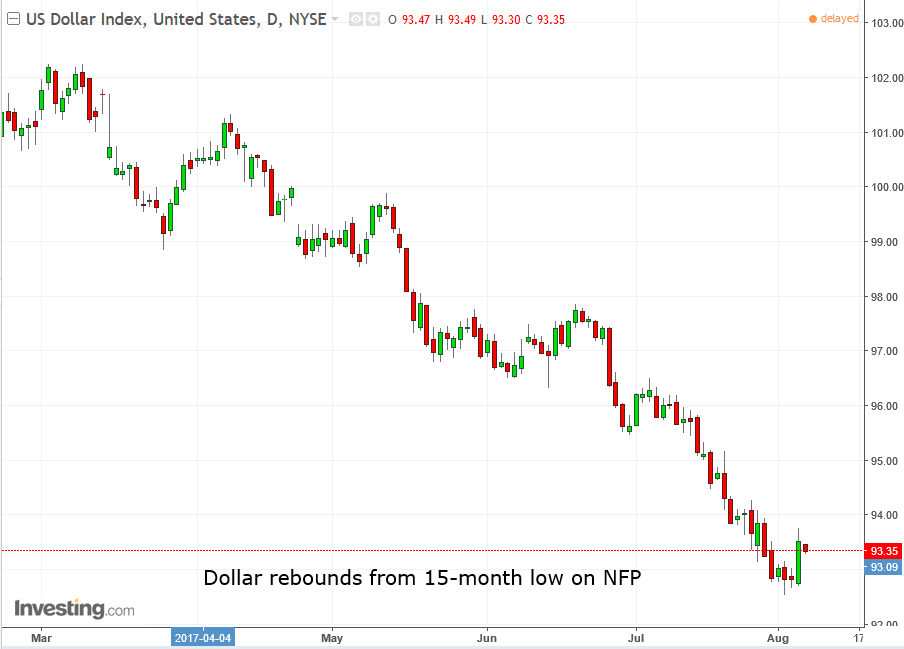
- The Dollar Index lost 0.17 percent, paring the 0.75 percent gain on Friday. The price is 93.63, as of 4:40 EDT
- The euro increased 0.3 percent to $1.1805.
- The British pound advanced 0.1 percent to $1.305.
- The Japanese yen decreased 0.1 percent to 110.82 per dollar.
Bonds
- The yield on 10-year Treasuries increased two basis points to 2.28 percent.
- Germany’s 10-year yield advanced one basis point to 0.48 percent.
- Britain’s 10-year yield gained less than one basis point to 1.18 percent.
Commodities
- West Texas Intermediate crude decreased 0.5 percent to $49.35 a barrel.
- Gold declined 0.1 percent to $1,257.63 an ounce, its weakest in a week.
- Copper advanced 0.1 percent to $2.89 a pound.
